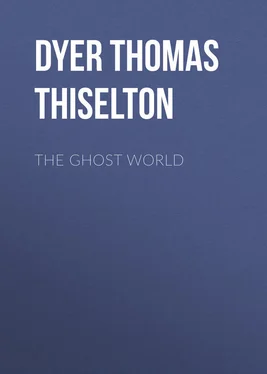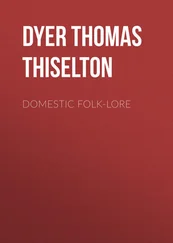Thomas Dyer - The Ghost World
Здесь есть возможность читать онлайн «Thomas Dyer - The Ghost World» — ознакомительный отрывок электронной книги совершенно бесплатно, а после прочтения отрывка купить полную версию. В некоторых случаях можно слушать аудио, скачать через торрент в формате fb2 и присутствует краткое содержание. Жанр: foreign_antique, foreign_prose, на английском языке. Описание произведения, (предисловие) а так же отзывы посетителей доступны на портале библиотеки ЛибКат.
- Название:The Ghost World
- Автор:
- Жанр:
- Год:неизвестен
- ISBN:нет данных
- Рейтинг книги:5 / 5. Голосов: 1
-
Избранное:Добавить в избранное
- Отзывы:
-
Ваша оценка:
- 100
- 1
- 2
- 3
- 4
- 5
The Ghost World: краткое содержание, описание и аннотация
Предлагаем к чтению аннотацию, описание, краткое содержание или предисловие (зависит от того, что написал сам автор книги «The Ghost World»). Если вы не нашли необходимую информацию о книге — напишите в комментариях, мы постараемся отыскать её.
The Ghost World — читать онлайн ознакомительный отрывок
Ниже представлен текст книги, разбитый по страницам. Система сохранения места последней прочитанной страницы, позволяет с удобством читать онлайн бесплатно книгу «The Ghost World», без необходимости каждый раз заново искать на чём Вы остановились. Поставьте закладку, и сможете в любой момент перейти на страницу, на которой закончили чтение.
Интервал:
Закладка:
As a curious illustration of how every spiritual conception was materialised in olden times, may be quoted the fanciful conception of the weight of the soul. Thus in mediæval literature the angel in the Last Judgment ‘was constantly represented weighing the souls in a literal balance, while devils clinging to the scales endeavoured to disturb the equilibrium.’ 49 49 See Lecky’s Rationalism in Europe , 1870, i. p. 340; cf. Maury’s Légendes Pieuses , p. 124.
But how seriously such tests of the weight of the soul have been received, may be gathered from the cases now and then forthcoming of this materialistic notion of its nature. These, writes Dr. Tylor, 50 50 Primitive Culture , i. p. 455.
range from the ‘conception of a Basuto diviner that the late queen had been bestriding his shoulders, and he never felt such a weight in his wife, to Glanvil’s story of David Hunter, the neatherd, who lifted up the old woman’s ghost, and she felt just like a bag of feathers in his arms; or the pathetic superstition that the dead mother’s coming back in the night to suckle the baby she has left on earth, may be known by the hollow pressed down in the bed where she lay, and at last down to the alleged modern spiritualistic reckoning of the weight of a human soul at from three to four ounces.’ But the heavy tread which occasionally makes the stairs creak and boards resound has been instanced as showing that, whatever may be the real nature of the soul, it is capable of materialising itself at certain times, and of displaying an amount of force and energy in no way dissimilar to that which is possessed when living in the flesh.
Just, too, as souls are possessed of visible forms, so they are generally supposed to have voices. According to Dr. Tylor, 51 51 See Andrew Lang’s Myth, Ritual, Religion , i. p. 108.
‘men who perceive evidently that souls do talk when they present themselves in dream or vision, naturally take for granted at once the objective reality of the ghostly voice, and of the ghostly form from which it proceeds;’ and this principle, he adds, ‘is involved in the series of narratives of spiritual communications with living men, from savagery onward to civilisation.’ European folk-lore represents ghostly voices as resembling their material form during life, although less audible. With savage races the spirit voice is described ‘as a low murmur, chirp, or whistle.’ Thus, when the ghosts of the New Zealanders address the living, they speak in whistling tones. The sorcerer among the Zulus ‘hears the spirits who speak by whistlings speaking to him.’ Whistling is the language of the Caledonians, and the Algonquin Indians of North America ‘could hear the shadow souls of the dead chirp like crickets.’ As far back as the time of Homer, the ghosts make a similar sound, ‘and even as bats flit gibbering in the secret place of a wonderful cavern, even so the souls gibbered as they fared together.’ 52 52 Odyssey , xxiv.
Ghosts, when they make their appearance, are generally supposed, as already noticed, to have a perfect resemblance, in every respect, to the deceased person. Their faces appear the same – except that they are usually paler than when alive – and the ordinary expression is described by writers on the subject as ‘more in sorrow than in anger.’ Thus, when the ghost of Banquo rises and takes a seat at the table, Macbeth says to the apparition —
Never shake
Thy gory locks at me.
And Horatio tells Marcellus how the ghost of Hamlet’s father was not only fully armed, but —
So frown’d he once, when in angry parle,
He smote the sledded Polacks on the ice.
The folk-lore stories from most parts of the world coincide in this idea. It was recorded of the Indians of Brazil by one of the early European visitors that ‘they believe that the dead arrive in the other world, wounded or hacked to pieces, in fact, just as they left this;’ 53 53 Tylor’s Primitive Culture , i. p. 451.
a statement which reminds us of a ghost described by Mrs. Crowe, 54 54 Night Side of Nature.
who, on appearing after death, was seen to have the very small-pox marks which had disfigured its countenance when in the flesh.
As in life, so in death, it would seem that there are different classes of ghosts – the princely, the aristocratic, the genteel, and the common. The vulgar class, it is said, delight to haunt ‘in graveyards, dreary lanes, ruins, and all sorts of dirty dark holes and corners.’ An amusing anecdote illustrative of this belief was related by the daughter of ‘the celebrated Mrs. S.’ [Siddons?] who told Mrs. Crowe that when her parents were travelling in Wales they stayed some days at Oswestry, and lodged in a house which was in a very dirty and neglected state, yet all night long the noise of scrubbing and moving furniture made it impossible to sleep. The servants did little or no work, for they had to sit up with their mistress to allay her fears. The neighbours said that this person had killed an old servant, hence the disturbance and her terror. Mr. and Mrs. S – coming in suddenly one day, heard her cry out, ‘Are you there again? Fiend! go away!’ But numerous tales similar to the above are still current in different parts of the country; and from time to time are duly chronicled in the local press.
CHAPTER IV
THE UNBURIED DEAD
The Greeks believed that such as had not received funeral rites would be excluded from Elysium. The younger Pliny tells the tale of a haunted house at Athens, in which a ghost played all kinds of pranks owing to the funeral rites having been neglected. It is still a deep-rooted belief that when the mortal remains of the soul have not been honoured with proper burial, it will walk. The ghosts of unburied persons not possessing the obolus or fee due to Charon, the ferryman of Styx, and Acheron, were unable to obtain a lodging or place of rest. Hence they were compelled to wander about the banks of the river for a hundred years, when the portitor, or ‘ferryman of hell,’ passed them over in formâ pauperis . The famous tragedy of ‘Antigone’ by Sophocles owes much of its interest to this popular belief on the subject. In most countries all kinds of strange tales are told of ghosts ceaselessly wandering about the earth, owing to their bodies, for some reason or another, having been left unburied.
There is a well known German ghost, the Bleeding Nun. This was a nun who, after committing many crimes and debaucheries, was assassinated by one of her paramours and denied the rites of burial. After this, she used to haunt the castle where she was murdered, with her bleeding wounds. On one occasion, a young lady of the castle, willing to elope with her lover, in order to make her flight easier, personated the bleeding nun. Unfortunately the lover, whilst expecting his lady under this disguise, eloped with the spectre herself, who presented herself to him and haunted him afterwards. 55 55 Yardley’s Supernatural in Fiction , p. 93.
Comparative folk-lore, too, shows how very widely diffused is this notion. It is believed by the Iroquois of North America, that unless the rites of burial are performed, the spirits of the dead hover for a time upon the earth in great unhappiness. On this account every care is taken to procure the bodies of those slain in battle. Certain Brazilian tribes suppose that the spirits of the dead have no rest till burial, and among the Ottawas, a great famine was thought to have been produced on account of the failure of some of their tribesmen to perform the proper burial rites. After having repaired their fault they were blessed with abundance of provisions. The Australians went so far as to say that the spirits of the unburied dead became dangerous and malignant demons. Similarly, the Siamese dread, as likely to do them some harm, the ghosts of those who have not been buried with proper rites, and the Karens have much the same notion. According to the Polynesians, the spirit of a dead man could not reach the sojourn of his ancestors, and of the gods, unless the sacred funereal rites were performed over his body. If he was buried with no ceremony, or simply thrown into the sea, the spirit always remained in the body. 56 56 Letourneau’s Sociology , p. 257.
Интервал:
Закладка:
Похожие книги на «The Ghost World»
Представляем Вашему вниманию похожие книги на «The Ghost World» списком для выбора. Мы отобрали схожую по названию и смыслу литературу в надежде предоставить читателям больше вариантов отыскать новые, интересные, ещё непрочитанные произведения.
Обсуждение, отзывы о книге «The Ghost World» и просто собственные мнения читателей. Оставьте ваши комментарии, напишите, что Вы думаете о произведении, его смысле или главных героях. Укажите что конкретно понравилось, а что нет, и почему Вы так считаете.












